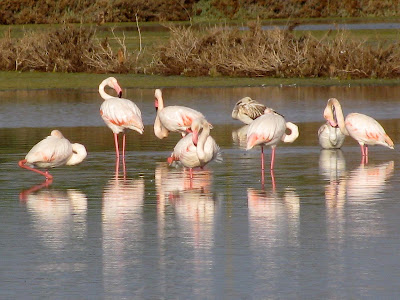I continued to look at Facebook after my son's death, even though many of my
friends' posts irritated me. How could they be posting gleeful photos and
writing such joyful things after what had happened? One by one I snoozed them
but I remained on Facebook and took a little joy in the many wonderful photos
I saw posted in the various nature groups I belong to.
In October I started to see photos of flamingos passing through Israel for the
winter. Between moments of great sadness, I suggested to Mister Handmade in
Israel that maybe we take a day off to go and see them for ourselves. It
required an early get up - flamingos are more active in the morning and
evening hours - and a good long drive to Atlit, a small town located on the
northern coast, about 20 kilometers south of the city of Haifa. Though far from it being his ideal day out, he was willing
to come with me.
Twice a year 500 million birds from 550 species including the flamingo,
fly over Israel on their way back and forth from their nesting grounds in
Europe and Asia. While a few hundred flamingos choose to stay here for the
winter, most of the population passes through Israel and continues to
Africa.
Israel has two places where the flamingos can find food. These are the saline
pools in Eilat and Atlit. The saline pools in Atlit belong to the Salt of the Earth salt company. They were mined for the production of table
salt. The permission in principle "to produce table salt from seawater in Atlit"
was given by the British as far back as October 1921. In a letter sent from
Downing Street, Mr. Shuckburgh, Winston Churchill’s assistant, wrote: "From
London's point of view, the matter is confirmed, and now permission is
subject to the British High Commissioner,
Sir Herbert Samuel."
The flamingos eat small shrimps, algae, small seeds, microscopic organisms,
mollusks and other plants and animals that live in shallow waters. It sucks
water through its sharp curved beak, which acts as a strainer and filters
out the food. The saline pools in Atlit are large and shallow, which allows
for the evaporation of salt water for the salt mineral industry. During this
evaporation process, large amounts of pink species of algae and miniature
crustaceans grow on the water. Flamingos love this pink delicacy and
they get their pink colour from this food. The young flamingo is mostly grey
in colour but while growing and feeding on pink crustaceans, its body
metabolizes the pigments and turns the feathers pink. In fact, the name
flamingo comes from the Portuguese or Spanish word flamengo, which
means flame-coloured.
As a side benefit, the protected islands also solved serious flooding problems
caused by rising water levels in the saline pools, which took a severe toll upon
the population of the
little terns. Before
these efforts, the terns' population had dwindled to a perilous low of just
300 pairs. Salt of the Earth has also installed observation cameras in nesting
areas for continued research and monitoring.
While Atlit and Eilat are the main places in Israel to see flamingos, there
have also been sightings at
Kibbutz Nahsholim,
Ein Afek and Agamon Hula.
After quite some time viewing the flamingos, we took a short walk on the beach to see the Crusader fortress Château Pèlerin, and then hiked at Khirbet Karta, to see the ruins of another Crusader fortress (all of which I will blog about in another post). On our way home we made a return visit to the Mishmar HaSharon Reservoir in the Hefer Valley to see the pelicans that come to spend time at the reservoir during the migration season.
The Mishmar HaSharon Reservoir is one of many water storage facilities
built by the
Jewish National Fund
(JNF) in the Hefer Valley. The Vickar Observation Point, a large shaded
balcony that rises above the reservoir, offers a wonderful view of
thousands of
great white pelicans
and other birds in the reservoir.
Members of staff at the reservoir feed the pelicans with six tonnes of fish three to four times a week, during the three months that the pelicans are flying over Israel, all funded by the Ministry of Agriculture. Large flocks of pelicans used to cause immeasurable damage to local fish farms and were chased from one pond to the next, without being provided with an alternative food source. This exhausted some of the pelicans to the point of death. This "refueling station" at Mishmar HaSharon has been placed at the pelicans' disposal to provide them with enough food to allow them to continue their migration.
Members of staff at the reservoir feed the pelicans with six tonnes of fish three to four times a week, during the three months that the pelicans are flying over Israel, all funded by the Ministry of Agriculture. Large flocks of pelicans used to cause immeasurable damage to local fish farms and were chased from one pond to the next, without being provided with an alternative food source. This exhausted some of the pelicans to the point of death. This "refueling station" at Mishmar HaSharon has been placed at the pelicans' disposal to provide them with enough food to allow them to continue their migration.
As with previous visits, it was a wonderful thing to see. Our day out in
nature allowed us a little relief from what has been a horrendous few
months.













































7 comments:
How lovely to see a post from you. I have thought of you and your family many times over the past few months; you have been greatly missed. Your day out sounds wonderful. I love flamingos - we saw many of them when we visited the wildfowl and wetlands trust and I could have sat and watched them all day. The author Michael Morpurgo loves them too. He talked about them on Radio 4's 'Tweet of the Day' and said that the noise they make speaks to his soul. I know exactly what he meant. I didn't realise the origin of their name though, so thank you for that.
Take care, my friend. xx
I can't imagine how you deal with your recent experience, Lisa. It makes my blood run cold just to think about it. The loss is unimaginable. Thank heavens you have a loving husband and another son to help you through this. You have to be strong for them. Life is unbelievably cruel sometimes. I'm so glad you could take simple pleasure in a day like this. Flamingos are numerous here but the pelican an absolute novelty for me. Thanks for sharing, hon.
I have been popping by your blog regularly and I am so happy to see your latest post.
You have all been in my thoughts daily. I only wish I lived closer to have been able to give you a big hug and to offer my support.
You have been and are still going through so much, but I'm glad you were able to get out if even for a little while, to enjoy something simple together.
Flamingos are beautiful birds, what an absolute treat to see them.
Sending lots of love as always. Thinking of you Lisa. xx
I've been thinking of you and your family Lisa. Thanks for sharing this, I had no idea you could see wild flamingos in Israel!
I also think of you often and it's so nice to see a post from you. The flamingos and pelicans are beautiful and thank you for telling us all about them. It's good to hear they are getting looked after and fed during their migration. It sounds like a lovely day out, I hope your husband enjoyed it too. xx
Thank you for the unexpected information. Spouse and I lived in Israel for 2.5 years and have spent many holidays there since, and have never heard anyone mention either a flamingo or a pelican. My loss :( I would have loved to have seen them during their migratory period, especially since I will never see them in Australia.
I've missed you so much but you have been in my thoughts and prayers. I'm glad you went to see the flamingos. I do like them and enjoyed the photos. Sending you a big hug.
Post a Comment